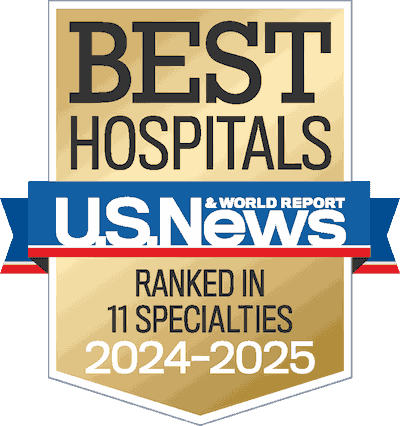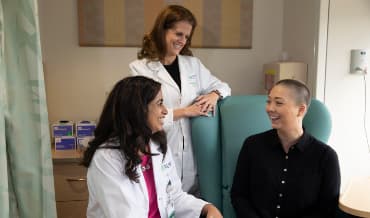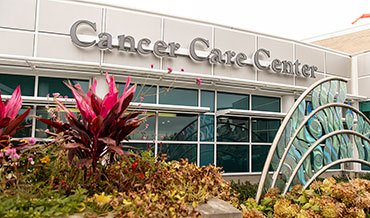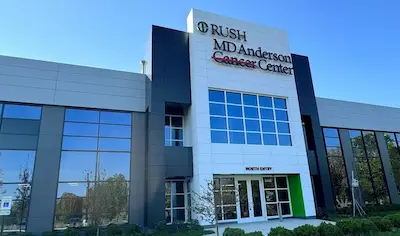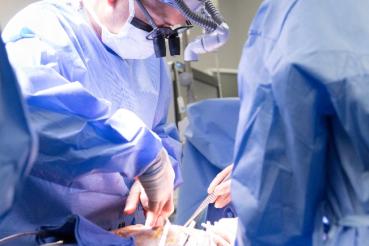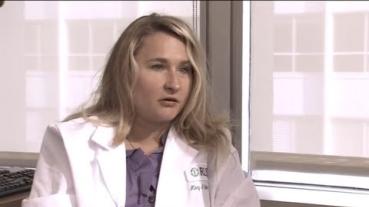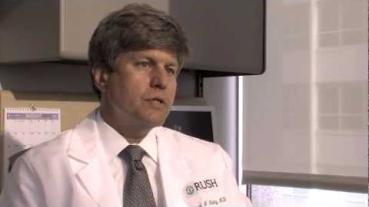The Rush Approach to Lung Cancer Treatment
As hope grows for people who have lung cancer, experts at Rush are leading the way with advanced lung cancer treatments and comprehensive care in and around Chicago.
For the past 25 years, our lung cancer program has brought together a team of medical oncologists, thoracic surgeons and radiation oncologists — who are all leaders in lung cancer care. Our combination of compassionate care and cutting-edge lung cancer treatments means you can expect personalized care from a team dedicated to finding the most effective ways for you to beat lung cancer and live a meaningful life.
Rush offers the most advanced diagnostic lung cancer options, like the Ion robot. We also provide leading-edge treatments, including immunotherapies, minimally invasive surgical options like video-assisted thoracoscopic surgery (VATS), and precision medicine. You’ll also have access to clinical trials looking at novel approaches to lung cancer treatment.
If you have lung cancer, your care team will recommend a personalized treatment plan that includes a full range of treatments to treat your lung cancer and, when needed, to relieve the side effects of treatment.
At Rush, we treat the whole person, not just the lung cancer. We'll focus on relieving pain, easing your breathing problems, and helping you have a better quality of life during and after treatment.

Lung Cancer Diagnosis at Rush
If your doctor suspects you have lung cancer, you may be sent for a biopsy, a procedure in which surgeons remove a small piece of lung tissue. A pathologist then examines the tissue under a microscope to see if cancerous cells are present. Rush also offers a less invasive ultrasound to biopsy for lung cancer.
Other tools that your Rush physician may use to diagnose your lung cancer, monitor whether the cancer has spread or check the progress of treatment include:
- Bone Scan
- MRI
- Positron Emission Tomography (PET Scan)
- X-Ray
Your Rush physician will use your diagnostic tests to assign your lung cancer a stage. Lung cancer staging takes into account your tumor’s size and location, whether it has spread to nearby lymph nodes, and metastasis, or how much the cancer has spread into other areas of the body. Because there are so many possible combinations of factors, your physician will explain what your stage means for your individual case, how it applies to your available treatment options and how it affects your prognosis.
Nonsurgical Treatments for Lung Cancer
- Biologic therapies, which help your body's immune system fight cancer and control the side effects of other treatments such as chemotherapy
- Chemotherapy and other drug regimens
- Complementary and alternative therapies, including acupuncture, massage therapy and counseling, to accompany your medical treatment plan.
- Photodynamic therapy, which uses a light-activated drug that kills cancer cells. Your team may recommend photodynamic therapy when a typical treatment program is not appropriate for you. It can also help relieve symptoms if you have non-small cell lung cancer that obstructs your airways.
- A vaccine, MAGE-A3 Antigen-Specific Cancer Immunotherapy that triggers your immune system to identify and attack specific tumor cells without harming normal cells.
- Radiation therapy, which may include conventional external beam radiation therapy — an option if you have small, localized lung tumors.
- Immunotherapies for non-small cell lung cancer that zero in on the cancer cells while sparing surrounding tissue. They include the following:
- Monoclonal antibodies, man-made versions of specific immune system proteins that prevent your tumor from developing new blood vessels to feed it. Monoclonal antibodies specifically target vascular endothelial growth factor (VEGF), a protein essential to the formation of new blood vessels.
- EGFR inhibitors, target epidermal growth factor receptors (EGFR), proteins found on the surface of cells that helps cells to grow and divide. EGFR inhibitors work by blocking EGFR from signaling the cells to grow, which can help keep some lung tumors under control. They can be used alone (without chemotherapy) as a first line of treatment if you have advanced non-small cell lung cancer that has certain mutations in the EGFR gene. They can also be used if you have advanced NSCLC without these mutations if chemo isn't working for you.
- EGFR inhibitors that also target cells with the T790M mutation, can help fight against cells with T790M mutation. Typically, EGFR inhibitors stop working after a few months because the cancer cells develop another mutation in the EGFR gene.
- EGRF inhibitors for squamous cell non-small cell lung cancer (necitumumab), can be used along with chemotherapy as the first treatment if you have advanced squamous cell NSCLC.
- Drugs that target the ALK gene (e.g., crizotinib, ceritinib), block the abnormal ALK protein (a rearrangement of the ALK gene found in about 5% of non-small cell lung cancers) and help shrink tumors. These drugs can help if chemotherapy has stopped working for you, but may also be used instead of chemotherapy if your cancer has the ALK gene rearrangement. Your team may also recommend crizotinib as first-line therapy if you have advanced non-small cell lung cancer and your tumors have a rearrangement in the ROS1 gene.

Surgical Treatments for Lung Cancer
- Lobectomy is the surgical removal of a section of the lung, known as a lobe.
- Lung resection is a surgery that only removes the mass in the lung and some of the surrounding tissue.
- Pneumonectomy is the surgical removal of one entire lung.
Minimally Invasive Lung Cancer Surgery
- NanoKnife, specialists use bursts of electricity to create microscopic holes in cancer cells to kill them.
- Video-assisted thoracoscopic surgery (VATS): Experts in this surgery, specialists at Rush use VATS for almost 75 percent of lobectomies (lung removal) surgeries, which help you recover quickly. The average hospital stay afterwards is 4.2 days, nearly half the national average, and you will experience less pain and a quicker return to your daily activities.
After your treatment, Rush offers rehabilitative services, including physical therapy, occupational therapy and speech therapy to help you regain your function and strength.
Rush Excellence in Lung Cancer Care
- Lung cancer screening to detect lung cancer early: If you have a high risk of developing lung cancer, lung cancer screening — available at all three Rush hospitals — helps detect lung cancers in their earliest stages, when they are most treatable. Our lung cancer screening sites are designated screening centers of excellence by the Go2Foundation for Lung Cancer — a designation given to centers that meet the highest standards for lung cancer screening.
- Diagnosing lung care faster, more accurate: Experts at Rush use a robotic-assisted bronchoscopy system called Ion to diagnose lung cancer faster and with more accuracy. This minimally invasive lung biopsy reaches more parts of the lung than a standard biopsy, so you get treated sooner.
- A leader in precision medicine: The lung cancer team works closely with Tempus — a biotechnology company that analyzes your specific genetic and clinical data and provides information about how your specific cancer may respond to targeted treatments. This allows your care team to tailor treatment to find the most effective option for treating your specific cancer.
- National leaders in lung cancer surgery: Your lung cancer treatment may include surgery. And at Rush, you're in good hands. The Society of Thoracic Surgeons has designated thoracic surgery at Rush a three-star program — the society’s highest rating — for lung cancer surgeries. Rush is one of 13 thoracic surgery programs in the nation that has earned the three-star distinction, which denotes an excellent program with better-than-expected outcomes for patients.
- Internationally recognized for excellence in patient care: Your care team will put you at the center of every decision about your treatment. This patient-centered approach led the International Association for the Study of Lung Cancer to name the Rush lung cancer program as one of five worldwide recipients of the foundation’s inaugural Cancer Care Team Award — which recognizes programs that provide the highest quality patient care.
Second Opinion Services for Lung Cancer Patients
There are many reasons you might seek a second opinion for your lung cancer diagnosis, and some health plans even require one in certain circumstances. If you do not need immediate, emergency care, this can be a helpful option to confirm your diagnosis and make sure you have all available options for treatment. Rush offers second opinion services to cancer patients, and some patients can even get a second opinion virtually. However, there are certain steps you should take, including speaking to your oncologist or primary care doctor, getting copies of your medical records and checking with your insurance company to find out what your policy covers.
To learn more about the services Rush offers to lung cancer patients, read our Cancer Second Opinion Services page. If you’re ready to schedule a second opinion at Rush for a lung cancer diagnosis you can call (312) CANCER-1, and our team will help you prepare for your appointment.
Frequently Asked Questions About Lung Cancer
Most patients with lung cancer do not experience any symptoms until the cancer has spread, which is why screening is so important if you’re at high risk. The symptoms that eventually appear also frequently result from conditions other than cancer, so there is no guarantee that these symptoms are a sign of lung cancer. Symptoms can include a persistent cough that worsens and may or may not produce blood, constant chest pain, shortness of breath and unexplained weight or appetite loss.
The most common type of lung cancer, non-small cell lung cancer, does not grow or spread as quickly as small cell lung cancer, which is almost always caused by cigarette smoking.
The exact rate at which lung cancer will spread varies from patient to patient. It is best to rely on your physician to run tests and monitor the spread of cancer to determine how fast it is spreading.
The most recommended treatments for lung cancer depend on the type and stage of the cancer.
For non-small cell lung cancer that hasn’t spread, physicians usually recommend surgery. However, surgery is often used together with other techniques such as radiation therapy and chemotherapy.
For small cell lung cancer, chemotherapy is the treatment most often recommended because the medicine circulates throughout the body and can kill lung cancer cells that may have spread. Physicians often use radiation therapy with chemotherapy in these cases when the tumor stays in the lung and chest area.
Your physician will work with you to provide the best treatment options for your specific case.
The effectiveness of lung cancer treatment varies widely from patient to patient. In some instances, treatment can completely remove or destroy the cancer. This is more common when treatment begins in early stages before the cancer has spread. However, there is still a chance that the cancer could come back.
In other cases, lung cancer cannot be “cured,” and patients must continue to receive treatments such as radiation therapy and chemotherapy to keep the cancer under control.
To find out how treatable your lung cancer is, you’ll need to rely on the advice of your physician. They can explain the treatment options available to you and monitor how effective they are.
The time it takes to recover from lung cancer surgery depends on several factors that are individual to each case. These include the type of surgery, the overall health of the patient and whether there are complications.
For a major operation, such as a pneumonectomy, recovery time can take a few weeks to a few months. However, for a minimally invasive surgery, such as VATS, recovery time can be much quicker.



